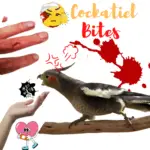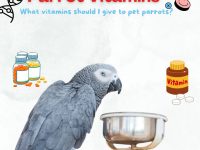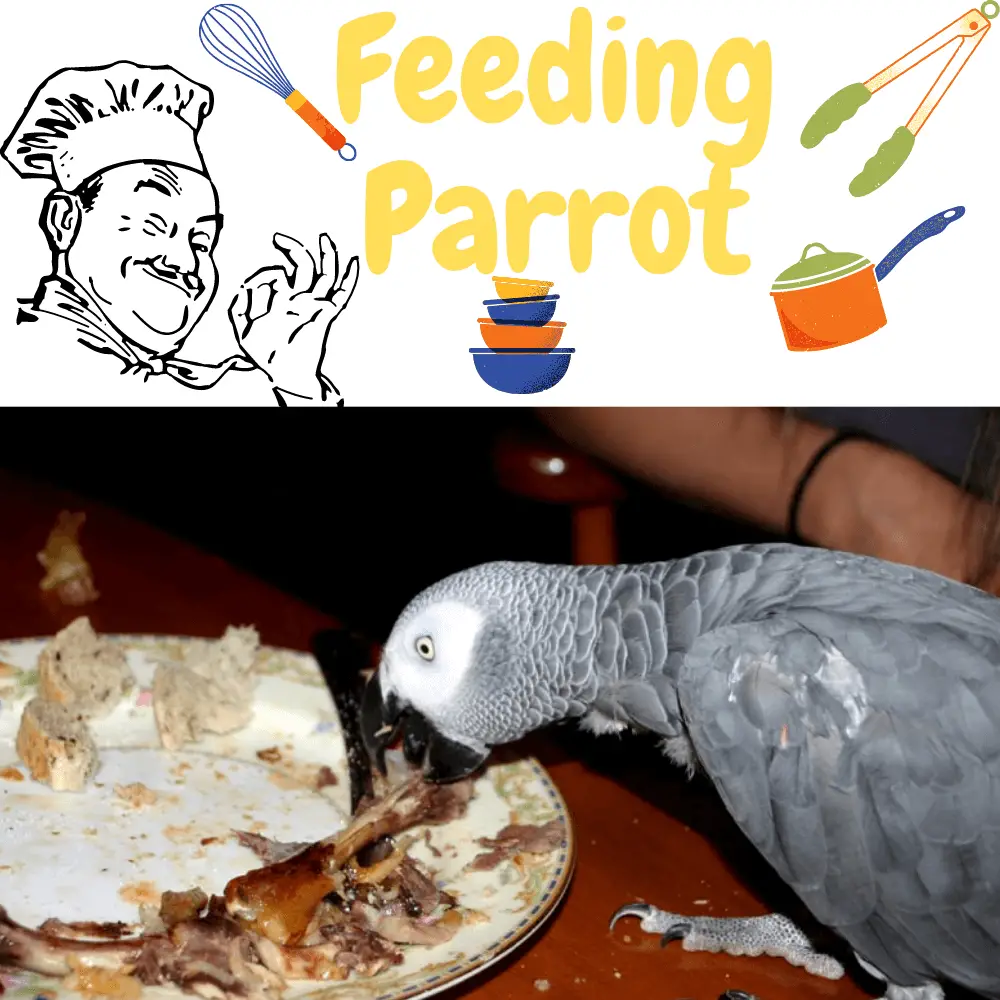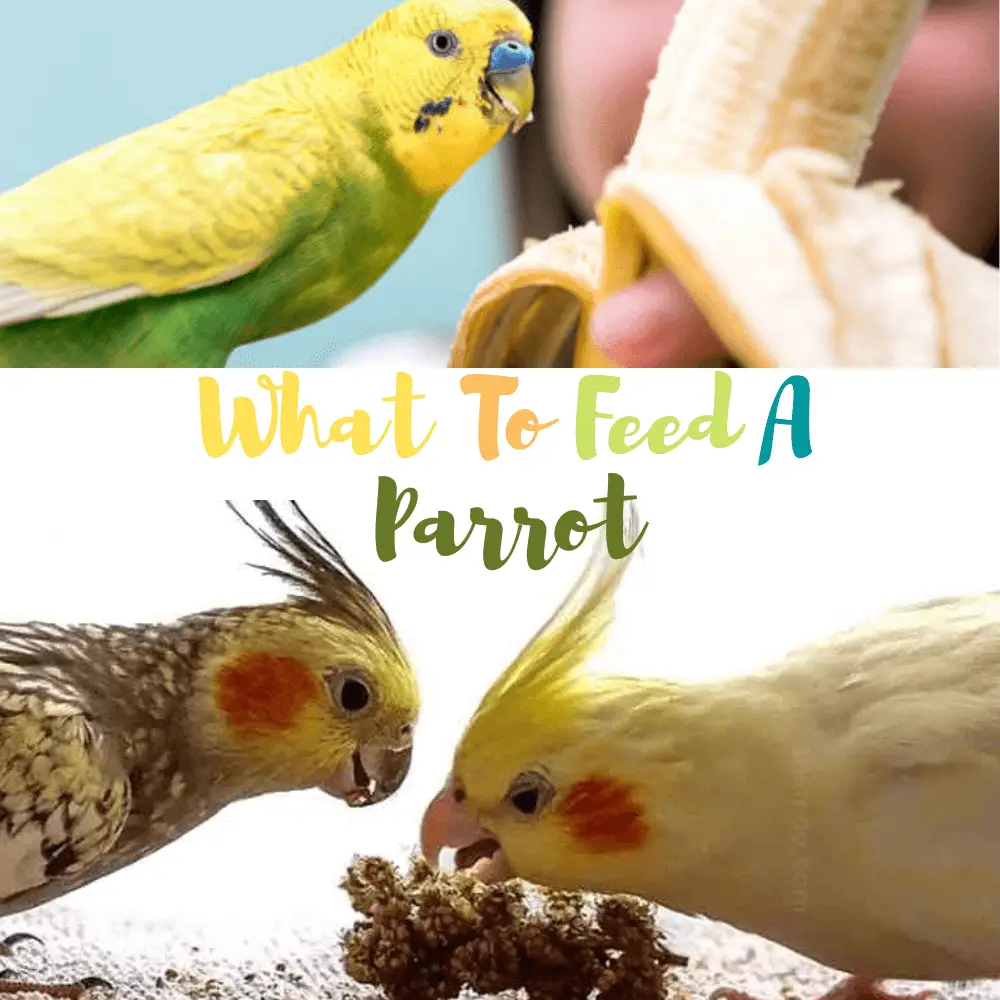
What to feed a parrot? and How to feed a parrot? It is essential to provide a proper diet for a parrot (Psittaciformes family) so that it has a healthy and long life. In fact, if you provide your parrot with a good diet through balanced diet, it will be more active and have a more beautiful plumage than a parrot that has nutritional deficiencies. You probably already know that your parrot loves seeds, even if they are only one part of a balanced diet. If you know what foods your parrot needs, you will be able to provide him with a diet that will allow him to stay healthy for a long time.
Know what to give your parrot
All you need to know to feed your parrot
Give pellets to your bird
It is an important food in the diet of a picky parrot on fresh fruits and vegetables. They come in various varieties of colors, sizes, and tastes. The pellets are made of mixtures of fruits, vegetables, seeds, and cereals and they have a very high nutritional value.
- When choosing pellets from a pet store, start by carefully reading the ingredient lists on the product packaging. Avoid products that contain many preservatives .
- As there is a very wide variety of granules, you can ask your veterinarian for advice on which mixtures are best for your parrot.
Include seeds in your bird’s diet
Even though birdseed should not be the bulk of your pet’s diet, it should be part of his diet, as they have great nutritional value for a parrot. As with pellets, there is a very wide variety of mixtures in pet stores in which you can find what best suits your parrot. The idea is to buy packages containing seed mixtures, but you can also buy packages each containing only one type of seed, and make mixtures yourself.
- There was a time when it was thought that sunflower seeds could be addictive to parrots, but this idea has never been verified.
- Before buying bird seeds, make sure they are fresh. You should not smell the slightest musty smell and there should be no traces of fungi and insects. Fresh seeds are shiny.
- Your parrot may prefer sprouted seeds. To germinate seeds, soak overnight the equivalent of a daily serving in fresh, clean water in a refrigerator or at room temperature. After 12 to 24 hours, the tips of the roots will begin to appear, which is a sign that the seeds are germinating. At that time, you can start giving them to your bird.
- The seeds are for parrots as are candy for humans. They are succulent and your parrot should only eat them from time to time. You can give seeds to your bird as rewards, for example, when you train it to do something.
Feed a parrot
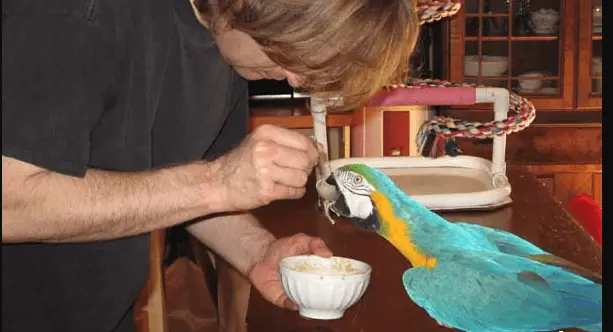
Add vegetables and grains to your parrot’s diet.
Among the vegetables, you can provide are peas, beans, and lentils which have great nutritional value. You could give your bird black beans, green beans, and chickpeas. Tofu is another food you could give your bird if they enjoy it. You can cook the vegetables or give them raw to your parrot.
Cereals should be whole like brown rice, in the form of pasta made from whole grains or made from barley. Preferably choose cereals that contain little salt.
Give your bird fruits and vegetables
You can add pieces of fruits and vegetables to your parrot’s diet. There are many fruits and vegetables that parrots enjoy, such as apples, broccoli, peaches, and collard greens. Whatever fruits and vegetables you choose to give your bird, you should rinse them well with fresh water just before feeding your bird. Remember that fruit contains a relatively large amount of sugar and that is why it should not represent too large a part of a food ration for your parrot.
- Keep in mind that the pellets are made up of part of the fruit and your bird will get from them about the same nutrients that are provided by mixtures of pieces of fruit. But fresh fruits and vegetables are to be favored with granules and extruded because they are more stimulating for the bird that has differences in texture and fresh taste.
- Cut fruits and vegetables into pieces in a feeder or hang them with the skin to keep them occupied.
- Some fruits can cause your bird’s feces to be colored, which should not be a source of concern for you.
Feed a parrot
Give your bird nuts
It is a food that can be added to the diet of a parrot. Nuts are rich in protein, vitamins, and minerals, but they also contain a lot of fat. Because of the large amount of fat they contain, you should only give your bird in moderation. For example, you could give it to your parrot as a reward during a workout or for special occasions.
- Among the nuts, you can give your bird are simple walnuts, macadamia nuts, hazelnuts, pistachios, and cashews.
- You need to provide your parrot with nuts that are not salted. If possible, leave the shells around the nuts. Wild parrots often use their beaks to break nut shells. By providing your bird with nuts with its shells, you will force it to make some effort to get its food, which will actually be a great physical and mental exercise for it. Know that the ability to break shells in a parrot is a learned behavior (not innate) ).
- Parrots of the genus Ara particularly appreciate nuts and fatty foods, more than most other species.
Add meat to your bird’s diet
Parrots are omnivores And that’s why you can give them meat. They especially appreciate white chicken meat which is very healthy for them. Be sure to cook the meat thoroughly before giving it to your bird.
- If your parrot eats too much meat, he could have kidney problems and that’s why you should only provide him with small portions of meat.
Avoid giving your bird certain foods
- If you do not properly store the peanuts you provide to your bird, for example, by leaving them in a dark, warm and humid place, fungi could grow there and produce aflatoxin which is a very toxic substance for parrots. Aflatoxin can even be deadly to parrots and that’s why it’s often best not to give peanuts to these birds.
Give your parrot fresh water
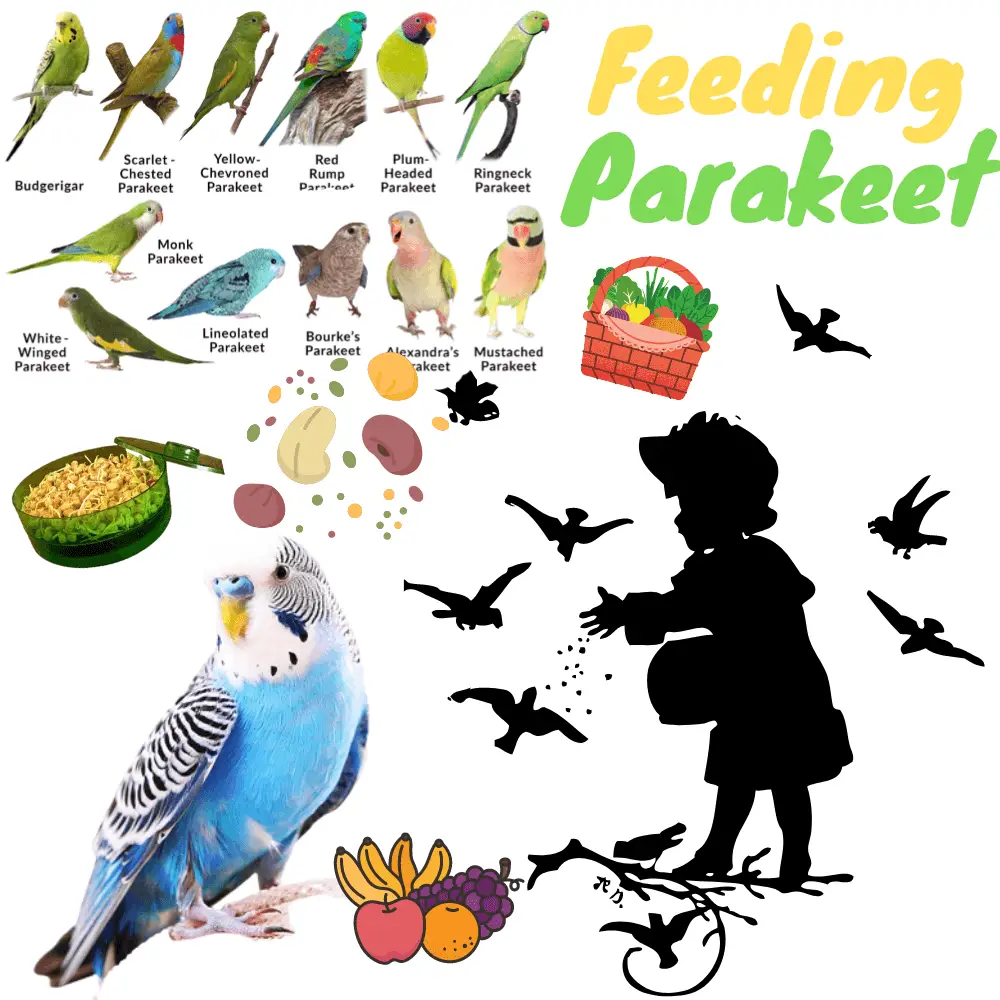
Know how to feed your parrot
Feed your parrot twice a day
The amount of food you will give him depends on his age, his species, and his general state of health. The vet will likely give you advice so that you provide the right foods in the right amounts. In the morning and evening, give him small amounts of seeds and pieces of fresh fruits and vegetables, as well as other foods that are healthy for him. Wait about an hour before removing leftover food to reduce the chances of water being soiled.
- Remember to give your bird only one or two teaspoons of seeds most of the time.
- After he has eaten his seeds and some fresh food, give him pellets (only in the morning). He will probably not eat them all at once and will tend to peck throughout the day and that is why you should not remove the pellets you gave him in the morning.
- If your parrot is small, a quarter glass of pellets a day should be enough for him. On the other hand, if it is large, you should give it half a glass of pellets a day, which should be more than enough. Instead of giving him everything at once in his cage, you could provide the pellets in small portions at regular intervals, if you have time.
- You should provide him with very small amounts of the other foods that make up his diet. For example, if your parrot is small, you could give him half to a teaspoon of small pieces of fruit, half a teaspoon of small pieces of vegetables, and half a teaspoon of protein-rich food like hazelnut or cooked meat daily. If your parrot is large, you could give him a teaspoon of small pieces of fruit, a teaspoon of small pieces of vegetables, and a teaspoon and a half of protein-rich food.
Feed a parrot
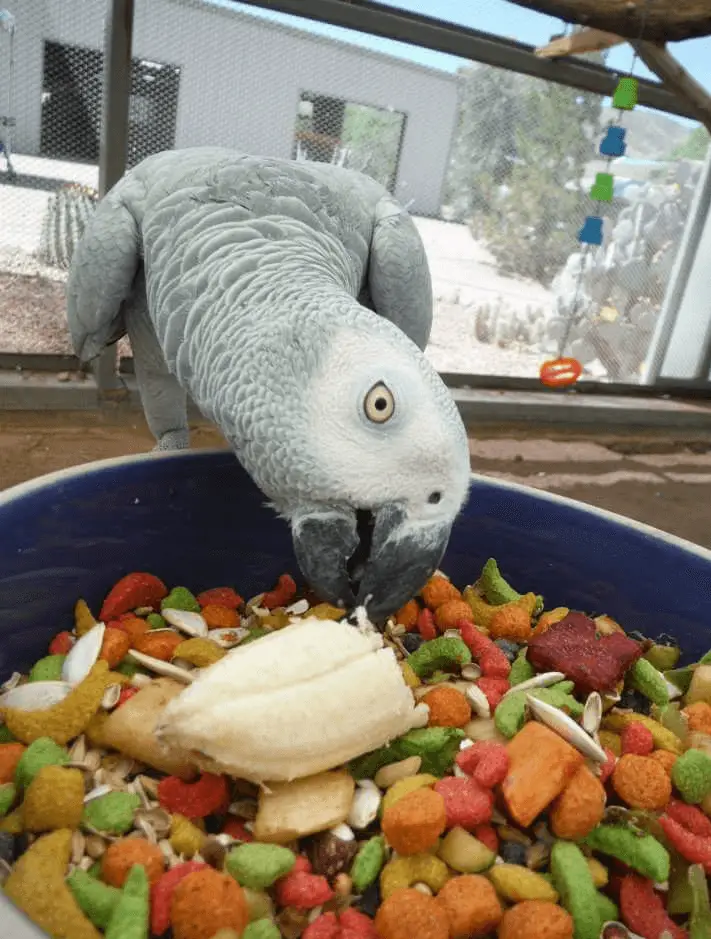
Encourage your parrot to forage
In the wild, parrots spend much of their time looking for food. You need to prevent your bird from becoming too lazy and idle when it comes to food, so you need to make some effort to get it. For example, you could spread pellets in gravel over the entire surface of a tray. This would prompt him to look for the pellets in the gravel so that he could eat them.
- You could also insert pieces of food into toys, specially made to encourage parrots to forage, that can be purchased at a pet store.
- By having to search for food, your parrot will keep busy and mentally stimulated, which should help reduce the chances of him suffering from behavioral problems.
Prevent your bird from having an obesity problem
Indeed, obesity can be a serious problem for a parrot, especially if it eats too many fatty foods. Obese parrots can have potentially fatal liver diseases. If you notice that your bird is getting a little wrapped, consider taking it to the vet. By reducing the amount of food you give him, you should be able to help him lose weight, but you should also always ensure that his diet remains healthy and balanced.
- Some species of parrots, among which there are cockatiel parakeets, Amazonian parrots tend to gain weight and can develop liver diseases due to excess fat storage.
Avoid vitamin A deficiency
You need to make sure that your parrot absorbs enough. Vitamin A strengthens the parrot which can then better fight infections. A deficiency of this vitamin is common in birds that can then become ill. Often, vitamin A deficiency can affect the parrot’s respiratory system and it can then develop a breathing problem such as a runny nose, difficulty breathing, or sneezing. If you notice any of these symptoms, take it to the veterinarian, who will be able to prescribe an appropriate treatment.
- Vitamin A deficiency can also affect the kidneys and digestive organs of the parrot.
- If you provide your bird with a healthy, balanced diet, it should absorb enough vitamin A to stay healthy.
Advice
- Ask the veterinarian for advice if you are not sure that giving your parrot the food you consume is a good thing for him.
- The ideal percentage of each type of food in the diet of a parrot varies depending on the characteristics of the bird (species, age, state of health, etc.). For example, veterinarians sometimes recommend setting the number of pellets at 80% of the diet, but some think 25% is more than enough. The veterinarian will help you determine the ideal balance for the foods that make up your parrot’s diet.
WHAT SHOULD YOU FEED YOUR BIRD? |My Parrots’ Complete Diet
SOURCE:ElleAndTheBirds


